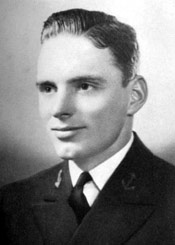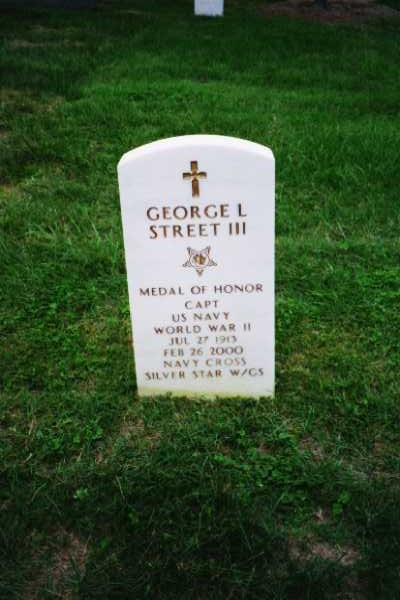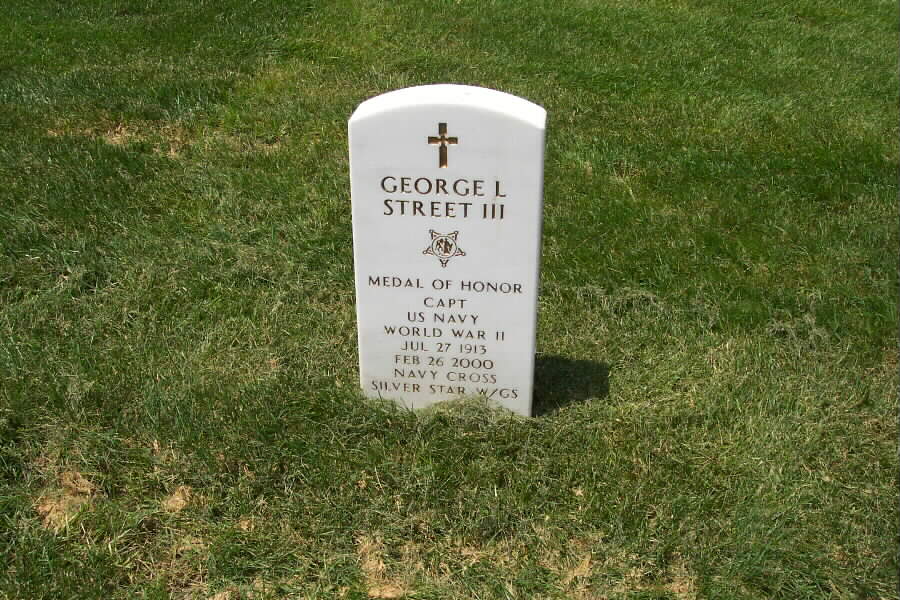From a contemporary press report:
Captain George L. Street III of Andover, Massachusetts, a Medal of Honor recipient and retired Naval officer, died Saturday, February 25, 2000, at the Academy Manor Nursing Home in Andover. He was 86.
A native of Richmond, Virginia, he graduated from the U.S. Naval Academy in Annapolis, Maryland in 1937. He moved to Andover upon his retirement in the mid 1960s.
During World War II, Captain Street commanded the submarine USS Tirante. On its first patrol, Captain Street ordered a surface attack on a Japanese munitions ship in the Korean harbor of Quelpart Island. The light from the exploding munitions ship revealed the submarine’s position to two enemy destroyers. Captain Street directed a defensive attack and sank both attacking destroyers.
For his courage under fire in the action, Congress awarded Captain Street the Medal of Honor, the nation’s highest military decoration.
Captain Street was also awarded the Navy Cross, two Silver Stars and Submarine Combat Insignia. The crew of the USS Tirante, which included future Massachusetts Governor Endicott Peabody, was awarded a Presidential Unit citation.
After the war, Captain Street served as head of the Sub-surface and Surface Warfare Division of the Office of Naval Research.
In this capacity, he worked to establish the first undersea warfare symposium in Washington, D.C.
In 1958, he served as the commanding officer of the USS Fremont. This ship participated in operations during the Lebanese Crisis.
He was appointed to a professorship in naval science at MIT in 1959. He worked at various other academic institutions until he retired in 1966. He was active even in retirement, teaching NROTC at Woburn High School until 1990.
He was a member of Christ Church in Andover, the Kiwanis Club of Andover, the Ancient and Honorable Artillery Company and the Ward Room Club of Boston. Additionally, he was involved in the Sons of Cincinnatus.
He is survived by his wife, Mary M. (McKenna); a son, George L. IV of Portland, Maine; a daughter, Kristopher Terry of Kingsport, Tennessee a sister, Melinda Olgevy of Old Greenwich, Connecticut; four grandchildren and many nieces and nephews.
A memorial service will be held at 2 p.m. Sunday at Christ Church, Andover.
Captain Street was buried in Section 7-A of Arlington National Cemetery on March 14, 2000.
By Richard Goldstein,, March 5, 2000
Captain George L. Street III, who won the Medal of Honor in World War II for directing a daring submarine attack that destroyed three Japanese ships off the coast of Korea, died February 26, 2000 at a nursing home in Andover, Mass. He was 86.
Serving as the skipper of the submarine Tirante, Street, then a lieutenant commander brought his boat into the Japanese anchorage off Quelpart Island, a high, rocky spot containing an air base, in the early hours of April 14, 1945.
The waters, about 100 miles south of Korea, were heavily mined and the Japanese had radar-equipped patrol vessels off the island in addition to five shore-based radar stations.
But Street was determined to find Japanese ships and sink them. He approached the harbor on the surface at night, gun crews at their stations. If the submarine was detected, it would have to shoot its way out of trouble because the waters were too shallow for it to dive.
At 4 a.m., the Tirante fired torpedoes at a large ammunition ship.
“A tremendous, beautiful explosion,” Street would write in his report. “A great mushroom of white blinding flame shot 2,000 feet into the air. Not a sound was heard for a moment, but then a tremendous roar flattened our ears against our heads. The jackpot, and no mistake!”
The explosions lighted up the harbor.
“In the glare of the fire, Tirante stood out in her light camouflage, like a snowman in a coal pit,” Commander Street would report. “But, more important, silhouetted against the flame were two escort vessels, both instantly obvious as fine new frigates of the Mikura class. Steadied to pick off the two frigates.”
The Tirante did just that, using two torpedoes to blow up one of the frigates and destroying the other one with one torpedo. Street then took the Tirante out of the harbor at full speed and dived, eluding depth charges from a pursuing patrol.
While the Tirante had been approaching the Japanese-held harbor, it had received word over its radio of the death of President Franklin D. Roosevelt and the ascension to the presidency of Harry S. Truman. A few hours after the Tirante completed its mission, it sent a message to the Pacific submarine command reading: “Three for Franklin … Sank ammunition ship two escorts.”
Street received the Medal of Honor from Truman at the White House on Oct. 6, 1945, and was a recipient of the Navy Cross. He was decorated a second time by Truman in December1947, receiving a gold star in lieu of a second Silver Star for his actions in World War II.
George Levick Street III, a native of Richmond, Virginia, graduated from the U.S. Naval Academy in 1937. He took part in war patrols on the submarine Gar before assuming command of the Tirante. After World War II, he held a variety of administrative and seagoing posts before retiring from the Navy in 1966 as a
captain.
He is survived by his wife, Mary, of Andover; a son, George L. Street IV of Portland, Maine; a daughter, Kris Terry of Kingsport, Tenn.; a sister, Melinda Ogilvy of Old Greenwich, Conn.; and four grandchildren.
Street’s executive officer on the Tirante was Captain Edward L. Beach, also a recipient of the Navy Cross, whose best-selling novel “Run Silent, Run Deep” (Holt, Rinehart & Winston, 1955) drew on his experiences aboard the Tirante and other World War II submarines. Endicott Peabody, a future governor of Massachusetts, was a lieutenant on the Tirante.
Despite all his individual honors, Street was exceedingly proud of a collective award, the Presidential Unit Citation, which went to the Tirante for its overall combat record. As Street put it, “I really treasure that more than the Medal of Honor because every man was there with us.”
Medal Of Honor Citation:
STREET, GEORGE LEVICK, III
Rank and organization: Commander, U.S. Navy, U.S.S. Tiranle. Place and date: Harbor of Quelpart Island, off the coast of Korea, 14 April 1945. Entered service at. Virginia. Born: 27 July 1913, Richmond, Virginia. Other Navy awards: Navy Cross, Silver Star with 1 Gold Star.
Citation:
For conspicuous gallantry and intrepidity at the risk of his life above and beyond the call of duty as commanding officer of the U.S.S. Tiranle during the first war patrol of that vessel against enemy Japanese surface forces in the harbor of Quelpart Island, off the coast of Korea, on 14 April 1945. With the crew at surface battle stations, Commander (then Lieutenant Commander) Street approached the hostile anchorage from the south within 1,200 yards of the coast to complete a reconnoitering circuit of the island.
Leaving the 10-fathom curve far behind he penetrated the mined and shoal-obstructed waters of the restricted harbor despite numerous patrolling vessels and in defiance of 5 shore-based radar stations and menacing aircraft. Prepared to fight it out on the surface if attacked, Commander Street went into action, sending 2 torpedoes with deadly accuracy into a large Japanese ammunition ship and exploding the target in a mountainous and blinding glare of white flames.
With the Tiranle instantly spotted by the enemy as she stood out plainly in the flare of light, he ordered the torpedo data computer set up while retiring and fired his last 2 torpedoes to disintegrate in quick succession the leading frigate and a similar flanking vessel.
Clearing the gutted harbor at emergency full speed ahead, he slipped undetected along the shoreline, diving deep as a pursuing patrol dropped a pattern of depth charges at the point of submergence. His illustrious record of combat achievement during the first war patrol of the Tiranle characterizes Comdr. Street as a daring and skilled leader and reflects the highest credit upon himself, his valiant command, and the U.S. Naval Service.
Street, George Levick III
b. 07/27/1913, d. 02/26/2000
US Navy, Captain
Res: Andover, Massachusetts
Section 7A, Grave 130-B, buried 03/15/2000
Michael Robert Patterson was born in Arlington and is the son of a former officer of the US Army. So it was no wonder that sooner or later his interests drew him to American history and especially to American military history. Many of his articles can be found on renowned portals like the New York Times, Washingtonpost or Wikipedia.
Reviewed by: Michael Howard



